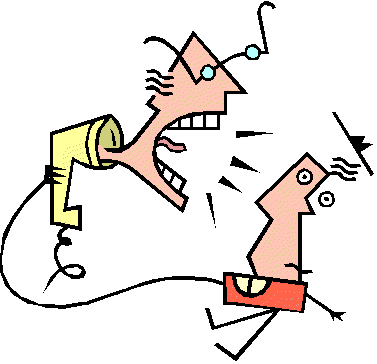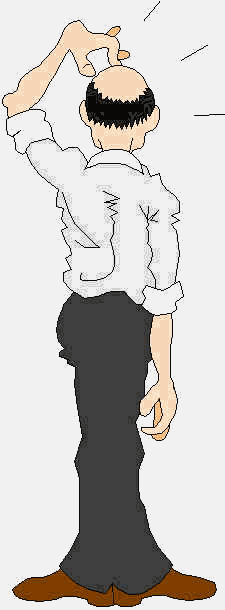
Module 1 Strand C2
![]() Module 2
Module 2 ![]() Module 3
Module 3 ![]() Module 4
Module 4 ![]() Overview Map
Overview Map ![]() Caucus
Caucus ![]() Home
Home
Module 1 Strand C2
Conflict Resolution
Conflict Resolution 8 Steps
Reflection
![]()
Conflict Resolution
"Listening and responding to angry people requires special skills."
How Do You Respond To Conflict?

I found an interesting exercise, which you could
use to evaluate how you respond to conflict. Although it is part of a larger communication
package, it can be a stand-alone instrument that guides you through some self-reflection.
Take some time to read and respond to "Avoiding and
Resolving Conflicts."
The results of this are for you and for your own personal information.
About Conflict:
![]() Conflict is inevitable.
Conflict is inevitable.
Conflict develops because we are dealing with people's lives, jobs, children, pride, self-concept, ego and sense of mission or purpose.
Early indicators of conflict can be recognized.
There are strategies for resolution that are available and DO work.
Although inevitable, conflict can be minimized, diverted and/or resolved.
Beginnings of Conflict:
Poor communication.
Seeking power.
Dissatisfaction with management style.
Weak leadership.
Lack of openness.
Change in leadership
Conflict Indicators:
Body language.
Disagreements, regardless of issue.
Withholding bad news.
Surprises.
Strong public statements.
Airing disagreements through media.
Conflicts in value system.
Desire for power.
Increasing lack of respect.
Open disagreement.
Lack of candor on sensitive issues.
Lack of clear goals.
Conflict is destructive when it:
Takes attention away from other important activities.
Undermines morale or self-concept.
Polarizes people and groups, reducing cooperation.
Increases or sharpens difference.
Leads to irresponsible and harmful behaviour, such as fighting, name-calling
Conflict is constructive when it:
Results in clarification of important problems and issues.
Results in solutions to problems.
Involves people in resolving issues important to them.
Causes authentic communication.
Helps release emotion, anxiety, and stress.
Builds cooperation among people through learning more about each other.
Helps individuals develop understanding and skills.
Results in joining in to resolve the conflict
How to Communicate Differences
![]() Don't argue your position, Instead, simply state your needs and
concerns.
Don't argue your position, Instead, simply state your needs and
concerns.
![]() Don't question the other person's values or logic. Instead,
listen.
Don't question the other person's values or logic. Instead,
listen.
Don't make assumptions, interpret, or analyze the other position. Instead, ask for clarification.
Don't fight back or get defensive. Instead, ask them to clarify their criticisms.
Don't focus on personalities. Instead, focus on problems.
Don't fight for a single solution. Instead, encourage brainstorming new ideas.
Don't avoid confrontation or be submissive. Instead, stand up for your own feelings and concerns, but be open to others, too.
Conflict Resolution: An 8 Step Process
"The key to our success is how we explore our freedom, make our choices, and anticipate the consequences. Be alive to the alternatives." (author unknown)
Two books I would highly recommend to you for further reading on the process of reaching agreements are:
Getting To Yes: Negotiating Agreement Without Giving In
Getting Past No: Negotiating Your Way From Confrontation
The following is an outline of a process which is used to resolve conflicts, a problem solving process, if you will. (Anne Moote compiled this information for the University of Arizona 1998.)
1. Accept responsibility to do something.
Make sure that the issue is important enough to work on
Make sure all parties are willing to work on the issue
2. Set the stage.
Give time for emotions to cool down
Set parameters: identify a neutral meeting place; allot time
Discuss whether an outside 'person' (negotiator) is needed
3. Identify the problem.
Use open-ended questions, such as who, what, when, where
Identify any additional information that may be needed
Make sure all participants agree on the problem
4. Search for common goals.
Find areas of overlap and intersection
Collectively define goals in such a way that everyone feels some ownership
5. Identify a strategy to tackle the problem.
Brainstorm possible strategies for addressing the problem
Discuss all possible strategies
Keep brainstorming and discussing until a strategy is arrived at that all participants can accept
6. Refine the strategy.
Clearly and specifically identify what is needed to implement the strategy
Work collectively to determine precise wording
7. Prepare a written agreement.
Clearly and specifically identify the commitments of each participant
Have all participants ratify the decision (signatures)
8. Implement the agreement.
Periodically discuss and review progress
Rethinking how to resolve conflicts! Remember:
Focus on issues and interests, not people or positions
Post issues on big sheets of paper to focus people's attention away from each other and toward issues.
Focus on common needs or problems to build consensus
Return to focus on goals when discussion gets mired down
Develop agreed-upon criteria for evaluating problems and proposed solutions
Use peer-to-peer contact to overcome local resistance
Reflection
Exercise #16
Complete the following questions:
What has become clear to you as you went through this module?
What experiences have you had in resolving conflicts? Could you briefly outline one experience where you were responsible for its resolution?
What skill did you use which made the difference in resolving this conflict?
What questions do you have regarding conflict resolution

